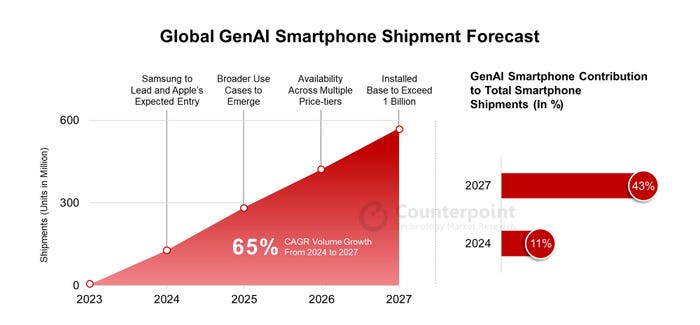Gen AI expected to account for over half of smartphones within four years
The latest forecast from Counterpoint Research anticipates global generative AI-capable smartphone shipment CAGR of 65% between 2024-27.
April 17, 2024

As a result, more than half of both units shipped and proportion of the total installed base accounted for by GenAI smartphones will exceed 50% some time in 2028, just four years after the first major launch of its type. While this kind of growth is remarkable on one level, the introduction of GenAI to Android makes it inevitable. Furthermore Apple is expected to join the party this year and leading mobile chip provider Qualcomm is hot for AI too.
“More than 10 OEMs have launched over 30 GenAI-capable smartphones so far,” said Tarun Pathak of Counterpoint. “AI in smartphones has been a key talking point since the start of this year, especially after the successful debut of the Galaxy S24 series, where Samsung has gained good mind share in marketing early AI use cases.
“We expect Samsung to lead GenAI smartphone OEM rankings in 2024. This is the second trend in the past couple of years where Samsung enjoyed an early-mover advantage; the first one being success of its foldables. The AI advantage will provide Samsung momentum in the mid-to-premium smartphone segment as GenAI features get recognized more broadly in coming years.
“Apart from Samsung, Apple’s anticipated entry in the space will further help the segment’s growth. Once Apple enters, we expect AI to immediately become a must-have feature in all mid-to-premium smartphone launches starting 2025. However, the real differentiation will lie in the use cases as consumers are still evaluating potential impact of AI in their future devices.”
“Smartphones of the future will be more personalized to cater to individual needs and preferences, and AI will play a central role in driving these personalized experiences,” said Mohit Agrawal of Counterpoint. “As OEMs differentiate themselves on AI positioning, the key here will be the evolution of AI use cases. Currently, these use cases include enhanced imaging capabilities, translation features, improved app experiences, content recommendations, creating more personalized content, and more.”

Counterpoint’s forecast only goes as far as 2027 but it’s clear the 50% mark will be hit soon after. It seems Samsung’s early entry did give it a sales uplift, but GenAI will be smartphone table stakes before long. Among the major GenAI players, Microsoft has the advantage of being able to offer its Copilot tool, among others, to PC users. But access to billions of smartphone users could significantly level the playing field for Google.
About the Author(s)
You May Also Like









.png?width=300&auto=webp&quality=80&disable=upscale)

_1.jpg?width=300&auto=webp&quality=80&disable=upscale)


.png?width=800&auto=webp&quality=80&disable=upscale)